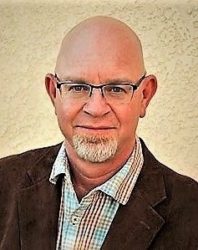 Scott Brassart
Scott Brassart
When I first entered recovery, my therapist asked about my personal boundaries, as well as the boundaries I’d grown up with. And honestly, I did not know how to respond. Mostly because I really didn’t understand what he meant by boundaries. Until then, the most thought I’d ever given to the concept of boundaries occurred when I created a posterboard map of my home state (Indiana) using pennies for the outer edges and yarn for the state’s many rivers.
From that moment until I entered the process of healing and recovery, boundaries were what separated Indiana from Michigan and Michigan from Canada. I simply did not realize that boundaries also applied to people. Mostly this misunderstanding arose because I grew up in a home where boundaries were random and malleable – changing at the whim of whoever the ranking member of the household was at any given moment. And as the youngest and therefore lowest ranking member of the household, I had no say in the matter.
On the rare occasions when I spoke up about feeling violated (I can think of two in particular), my concerns were not only dismissed, they were laughed at. I was told I was too sensitive and there was absolutely nothing wrong with the behaviors about which I was complaining. And that was the end of that. Boundaries applied to states and nations, not to me.
I carried that belief with me into adulthood and active addiction, which made it easy for me to behave badly and without empathy. And why would anyone expect otherwise from me, given that disrespecting the boundaries of others (and ourselves) was modeled for me throughout my childhood? I simply did not know any better until I entered a process of recovery and healing, where I learned that boundaries are essential in all successful interpersonal relationships.
What I have learned over the years is that healthy interpersonal boundaries are necessary for two primary reasons:
- They protect me from other people.
- They protect other people from me.
As a child, my boundaries were trampled, ignored, and belittled. As an adult, I trampled, ignored, and belittled the boundaries of any person unlucky enough to cross paths with me. Is it any wonder that so many of my relationships were emotionally shallow and short-lived? I did not have any boundaries in place to protect myself because I’d never been allowed the luxury of having such boundaries, and I did not think your boundaries were worth respecting because I’d never learned the importance of that idea.
Today, one of the unexpected gifts of recovery is that I have developed healthy boundaries to protect myself, and I am able to respect and abide by the healthy boundaries set by others. Best of all, this has been freeing rather than restrictive. Just because there are boundaries in place that keep me safe from others and others safe from me doesn’t mean I am walled off and alone. In fact, it means quite the opposite. Instead of isolating for protection, I and the people I interact with are able to safely invite one another in. Our healthy interpersonal boundaries keep us safe, which allows us to be honest and vulnerable and to know one another in ways that would not be possible without those boundaries. Thanks to healthy boundaries, we are closer rather than further apart.
* * * * * * * * * *
If your significant other is sex or porn addicted, or simply engaging in serial infidelity, you deserve support as you walk through this pain. To this end, Seeking Integrity offers online workgroups for couples and betrayed partners. Click HERE to learn about our couples’ group. Click HERE to learn about our workgroup for betrayed partners.
